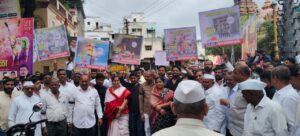Bombay High Court Rejects PIL Challenging Maharashtra Govt’s ‘Ladki Bahin’ and ‘Yuva Karya’ Schemes

Bombay High Court Rejects PIL Challenging Maharashtra Govt's 'Ladki Bahin' and 'Yuva Karya' Schemes
The Bombay High Court has dismissed a petition against two welfare schemes, emphasizing the government’s discretion in budgetary allocations.
The Bombay High Court has dismissed a Public Interest Litigation (PIL) seeking to quash the Mukhya Mantri Majhi Ladki Bahin Yojana and the Mukhya Mantri Yuva Karya Prashikshan Yojana. The petitioner argued that taxpayer money should be prioritized for infrastructure projects but the court upheld the welfare schemes. It highlighted their alignment with the Directive Principles of State Policy and their focus on disadvantaged groups.
The Mukhya Mantri Majhi Ladki Bahin Yojana provides Rs 1500 per month to women aged 21 to 60 who are married, widowed, divorced or without support. The Mukhya Mantri Yuva Karya Prashikshan Yojana offers a monthly stipend to men aged 18-35.
Chief Justice Devendra Kumar Upadhyaya and Justice Milind Borkar presided over the case. When petitioner Naveed Mulla’s advocate, Owais Pechkar, argued that taxpayer money should be used for infrastructure projects such as roads, highways, and schools, Chief Justice Upadhyaya questioned the court’s role in setting government priorities under Article 226. The bench emphasized that budgetary allocations are a legislative process and cannot be easily challenged.
Addressing claims of discrimination in the Ladki Bahin scheme against women earning above Rs 2.5 lakh, Chief Justice Upadhyaya clarified that equality must be assessed among equals, stating, “You can’t say persons earning up to Rs 2.5 lakh form the same class as persons earning more than that.”
The judges underscored that welfare schemes target disadvantaged groups and that Article 15 of the Constitution allows for provisions benefiting various sections of society, including women. Pechkar’s assertion that taxpayer money was being wasted was met with the response, “If tomorrow the government comes up with a scheme for providing free education, you’ll say it is a waste?” The court maintained that decisions on how tax revenue is spent are the prerogative of the government. When Pechkar questioned whether taxpayers have any say in these decisions, Chief Justice Upadhyaya replied, “No. You don’t have any say.”
Advocate General Birendra Saraf defended the schemes, noting safeguards to ensure that only genuinely needy women benefit. He explained that the employment incentive scheme’s stipend is limited to six months and is discontinued once a youth secures a job. Saraf highlighted that these initiatives further the Directive Principles of State Policy, reinforcing the government’s commitment to addressing societal inequities.












